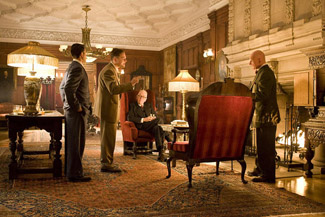She Said/He Said: Shutter Island
By Caroline Thibodeaux
March 3, 2010
The psychological thriller Shutter Island is the fourth and possibly most commercially viable collaboration yet between director Martin Scorsese and actor Leonardo DiCaprio. DiCaprio plays Teddy Daniels, a widowed U.S. Marshal just arriving at Ashecliffe – a mental institution for the criminally insane set on a remote island in the Boston Harbor. Accompanied by his new partner Chuck Aule (a more subdued than usual Mark Ruffalo) they are there to investigate the disappearance of inmate/patient Rachel Solando (Emily Mortimer) – a young housewife imprisoned there for murdering her three young children. Solando's escape cannot be logically explained and on the surface, takes on the form of a locked-room mystery. As Daniels attempts to dig deeper, he realizes there's a lot more going on at Ashecliffe than a simple search for a missing inmate. Feeling thwarted in his investigation by a less-than-cooperative staff led by Dr. Cawley (Sir Ben Kingsley), Daniels begins to suspect that Solando's impossible vanishing was assisted by someone on the inside. He also begins to believe that whoever is responsible for helping Solando escape may also be part of an even greater and shadier cover-up.
Taking place in 1954, the story and setting adeptly combine gothic elements with pulp fiction and post-war noir. A thinking person's B-movie, the plot, feel and characterizations are all informed by that era's pinko-commie paranoia and atomic age trepidation. It's a period in time of no cell phones, BlackBerrys or texting. Communications are not immediate and heroes Daniels and Aule have to do most of their traveling by foot and often through horrendous weather. The further their journey leads them away from the relative physical shelter of the institution, the more claustrophobic their investigation paradoxically manages to feel. It's DiCaprio's movie from start to finish and he ably conveys and interprets the sweaty discomfort the audience shares with Daniels. Someone is missing, but whom, how and why? How did they leave, where the heck did they go, and who helped them get there? Nothing makes sense, and Daniels' difficulty in tracking down any measure of truth becomes greatly magnified when he realizes he may or may not be losing his mind.
The movie itself isn't perfect by any means or even great, but it is entertaining enough and more hit than miss. It's a Scorsese film, so of course it is filmed and edited beautifully. Longtime collaborator Thelma Schoonmaker is on hand again to edit Robert Richardson's sumptuous cinematography. All of the normal Scorsese bells and whistles are here, the dramatically swooping camera angles, the pristine set designs lit and decorated so gorgeously it almost hurts your eyes. There is a stark contrast between what is deemed current real time versus the numerous flashback, dream and hallucination sequences. Particularly memorable are the operatic panoramas of the liberation at Dachau and the sunshine and textures that pervade Daniels' fugue remembrances of his recent earlier life with his deceased young wife Dolores (a sadly luminous Michelle Williams).
We decided to wait to see Shutter Island until I'd finished reading the novel by Dennis Lehane (Mystic River, Gone, Baby, Gone). In retrospect I think that may have been a good idea. The adapted screenplay by Laeta Kalogridis (who also served as executive producer) does a yeoman's job of making the necessary cuts and preserving most of the best lines from Lehane's novel. But there is a real problem with pacing and I'm not quite sure if this is Kalogridis', Scorsese's or Schoonmaker's fault. It could be and probably is a combination of the three. The second act is an especially bogged down slog. The conclusion of that second act and the beginning of the third become somewhat messy and scattered. It's so muddled at that point I was glad I had read the novel ahead of time if simply to be able to navigate myself through the unnecessary murk. I liked the fact that the audience gets a fully-realized payoff at the end, but even this portion of the film seemed to drag on a bit too long. It would have been great if the pacing in the film could have been up to the standard of the novel which clipped along brilliantly and never lacked in either build or tension. It felt like Scorsese had perhaps become a little too enamored of his own filmmaking by that time - this to the detriment of crisp storytelling and a need to wrap this thing up, which at a running time of two hours and 18 minutes could have used a slight trim.
As said before, it's good enough, but it probably should have been better. The performances are strong all around, including the peculiarly sympathetic Kingsley, Jackie Earle Haley in one riveting scene and a creepy Max Von Sydow whose emigrant Dr. Naehring suggests a Good Nazi hiding in plain sight. It is elegantly filmed and the production values are top notch, including a modern classical soundtrack compiled by music producer Robbie Robertson containing works by artists as varied as John Cage, Brian Eno and Dinah Washington. The film's overriding themes of loss, violence and disillusion to the point of delusion coalesce to present a shattering yet dismally earthbound portrait of a man at war with his own shame and guilt. The workings of a wonderful film are present throughout Shutter Island but unfortunately, all those components combined never quite get off that rock.




